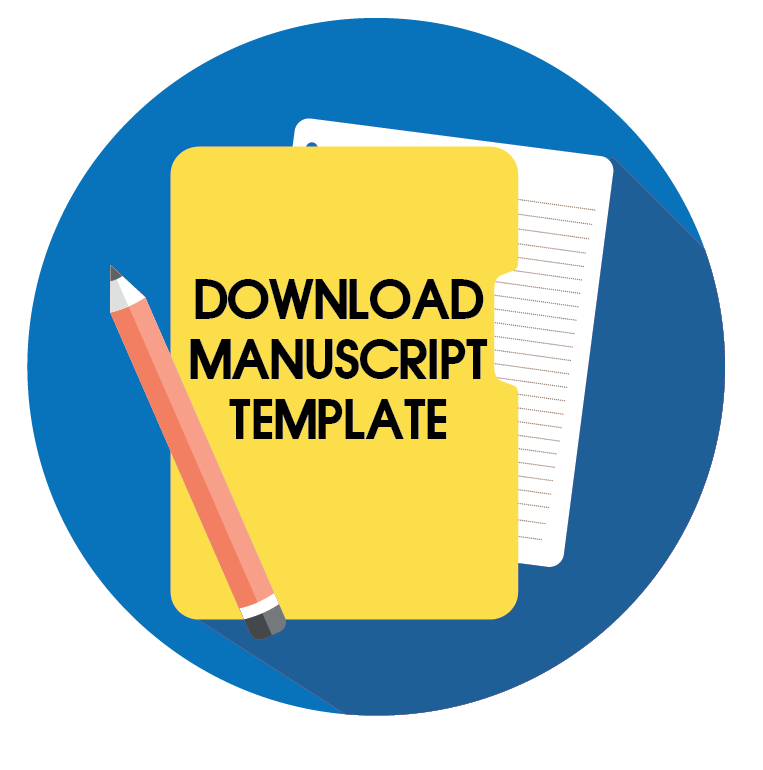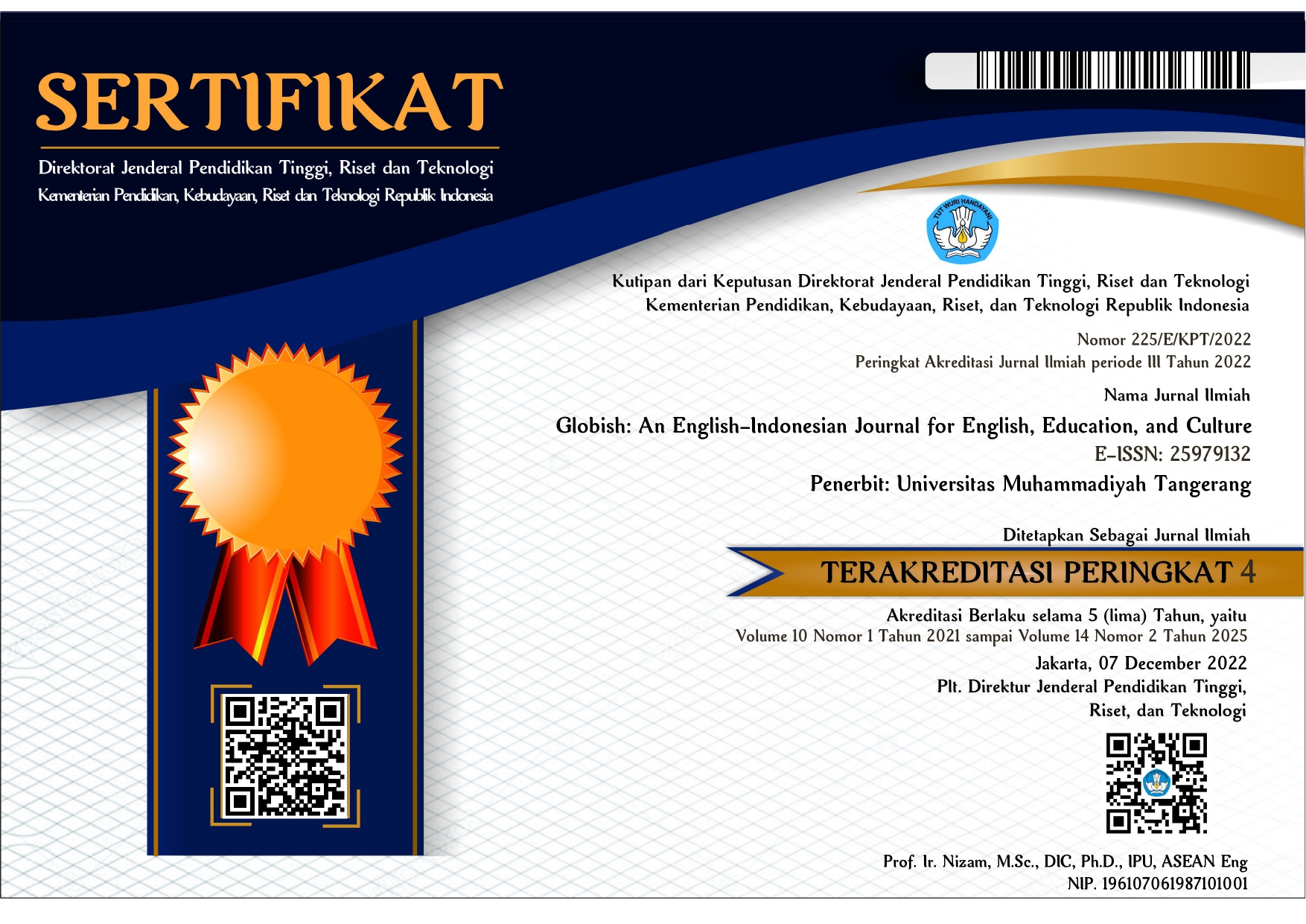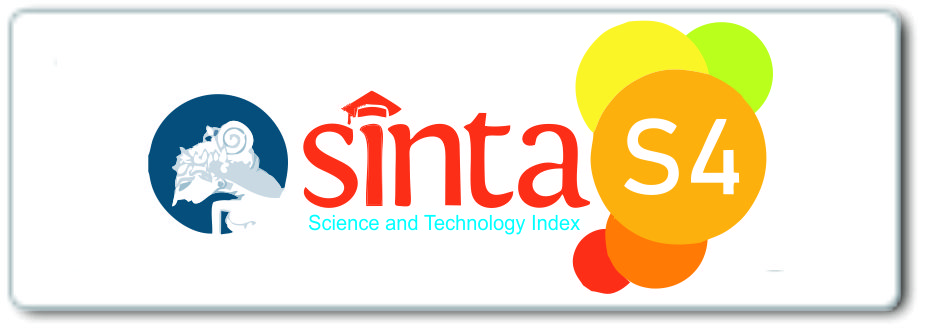STUDENTS’ LIVED EXPERIENCE IN UTILIZING QUILLBOT AS AN ONLINE PARAPHRASING TOOL IN ACADEMIC WRITING
Abstract
This study aimed to investigate students’ lived experience of Quillbot utilization in academic writing. The qualitative phenomenology method was used in this study to dig deeper into students’ lived experiences that they interpreted while using Quillbot. The result based on the data analysis showed some lived experiences that the students interpreted such as Quillbot’s benefits and students’ future use of Quillbot, students’ perceptions of autonomy and assistance, students’ ethical consideration when utilizing Quillbot, and students’ adoption of Quillbot’s suggestion. The results of this study also emphasized students' awareness that Quillbot is a supporting tool that cannot replace their writing skills. This study provides valuable insight into how students interact with Quillbot, how it influences their writing process, and broadens the perspective of teachers, lecturers, instructors, and the wider community who often consider AI to have negative impacts on students’ learning process.
Keywords
Full Text:
PDFReferences
Aldabbus, S., & Almansouri, E. (2022). Academic Writing Difficulties Encountered by University EFL Learners. British Journal of English Language Linguistics, 10(3). https://doi.org/10.37745/bjel.2013/vol10n3111
Carter, N., Bryant-Lukosius, D., Dicenso, A., Blythe, J., & Neville, A. J. (2014, September 1). The use of triangulation in qualitative research. Oncology Nursing Forum. Oncology Nursing Society. https://doi.org/10.1188/14.ONF.545-547
Cirocki, A., Anam, S., & Retnaningdyah, P. (2019). Readiness for autonomy in English language learning: The case of indonesian high school students. Iranian Journal of Language Teaching Research, 7(2).
Fitria, T. N. (2021). Grammarly as AI-powered English Writing Assistant: Students’ Alternative for Writing English. Metathesis: Journal of English Language, Literature, and Teaching, 5(1). https://doi.org/10.31002/metathesis.v5i1.3519
Fitria, T. N. (2022). Avoiding Plagiarism of Students’ Scientific Writing by Using the QuillBot Paraphraser. Elsya : Journal of English Language Studies, 4(3). https://doi.org/10.31849/elsya.v4i3.9917
Hajimaghsoodi, A., & Maftoon, P. (2020). The Effect of Activity Theory-based Computer-assisted Language Learning on EFL Learners’ Writing Achievement. Language Teaching Research Quarterly, 16. https://doi.org/10.32038/ltrq.2020.16.01
Haleem, A., Javaid, M., & Singh, R. P. (2022). An era of ChatGPT as a significant futuristic support tool: A study on features, abilities, and challenges. BenchCouncil Transactions on Benchmarks, Standards and Evaluations, 2(4). https://doi.org/10.1016/j.tbench.2023.100089
Kotamjani, S. S., Samad, A. A., & Fahimirad, M. (2018). International Postgraduate Students’ Perception of Challenges in Academic Writing in Malaysian Public Universities. International Journal of Applied Linguistics and English Literature, 7(7). https://doi.org/10.7575/aiac.ijalel.v.7n.7p.191
Kurniati, E. Y., & Fithriani, R. (2022). Post-Graduate Students’ Perceptions of Quillbot Utilization in English Academic Writing Class. Journal of English Language Teaching and Linguistics, 7(3). https://doi.org/10.21462/jeltl.v7i3.852
Moustakas, C. E. (1994). Phenomenological research methods Clark Moustakas. Phenomenological Research Methods, 20.
Muliani Sukma, E., Lubis, N., & Dewi, U. (2023). Quillbot As An AI-powered English Writing Assistant: An Alternative For Students to Write English. Jurnal Pendidikan Dan Sastra Inggris (JUPENSI), 3(2).
Nketsiah, I., Imoro, O., & Barfi, K. A. (2023). Postgraduate students’ perception of plagiarism, awareness, and use of Turnitin text-matching software. Accountability in Research. https://doi.org/10.1080/08989621.2023.2171790
Nurmayanti, N., & Suryadi, S. (2023). The Effectiveness Of Using Quillbot In Improving Writing For Students Of English Education Study Program. Jurnal Teknologi Pendidikan : Jurnal Penelitian Dan Pengembangan Pembelajaran, 8(1). https://doi.org/10.33394/jtp.v8i1.6392
Patton, M. Q. (2002). Qualitative research and evaluation methods. In Qualitative Inquiry (Vol. 3rd). https://doi.org/10.2307/330063
Prentice, F. M., & Kinden, C. E. (2018). Paraphrasing tools, language translation tools and plagiarism: An exploratory study. International Journal for Educational Integrity, 14(1). https://doi.org/10.1007/s40979-018-0036-7
Roganović, J., Radenković, M., & Miličić, B. (2023). Responsible Use of Artificial Intelligence in Dentistry: Survey on Dentists’ and Final-Year Undergraduates’ Perspectives. Healthcare (Switzerland), 11(10). https://doi.org/10.3390/healthcare11101480
Sarair, Astila, I., & Nurviani, R. (2019). Acehnese Students’ Skills In Paraphrasing English Texts: A Case Study at Two Universities in Banda Aceh. Proceedings of EEIC, 2(0).
Sulistyaningrum, S. D. (2021). Utilizing Online Paraphrasing Tools to Overcome Students’ Paraphrasing Difficulties in Literature Reviews. Journal of English Language Studies, 6(2). https://doi.org/10.30870/jels.v6i2.11582
Syahnaz, M., & Fithriani, R. (2023). Utilizing Artificial Intelligence-based Paraphrasing Tool in EFL Writing Class: A Focus on Indonesian University Students’ Perceptions. Scope : Journal of English Language Teaching, 7(2). https://doi.org/10.30998/scope.v7i2.14882
Schmohl, T., Watanabe, A., Fröhlich, N., & Herzberg, D. (2020, June). How Artificial Intelligence can improve the Academic Writing of Students. In Conference Proceedings. The Future of Education 2020.
Van Manen, M. (1990). Researching lived experience. Researching Lived Experience, 35–51.
Walker, A. L. (2008). Preventing unintentional plagiarism: A method for strengthening paraphrasing skills. Journal of Instructional Psychology, 35.
Xuyen, N. T. (2023). Using the Online Paraphrasing Tool Quillbot to Assist Students in Paraphrasing the Source Information: English-majored Students’ Perceptions. Proceedings of the 5th Conference on Language Teaching and Learning. https://doi.org/10.21467/proceedings.150.3
Zulfa, S., Sari Dewi, R., Nuruddin Hidayat, D., Hamid, F., & Defianty, M. (2023). The Use of AI and Technology Tools in Developing Students’ English Academic Writing Skills. The Annual International Conference on Education.
Турлыбеков, Б. Д. (2023). THE ROLE OF WEB-BLOGGING ON DEVELOPING EFL STUDENT’S ACADEMIC WRITING SKILLS. Известия. Серия: Педагогические науки, 70(3).
DOI: http://dx.doi.org/10.31000/globish.v13i1.10088
Article Metrics
Abstract - 10279 PDF - 2431Refbacks
- There are currently no refbacks.
Globish
Program Studi Pendidikan Bahasa Inggris
Fakultas Keguruan dan Ilmu Pendidikan
Universitas Muhammadiyah Tangerang
Jl. Perintis Kemerdekaan I/33, Cikokol
Kota Tangerang, Indonesia
e-mail: globish_journal@umt.ac.id
Globish (p-ISSN: 2301-9913 | e-ISSN: 2301-9913) is licensed under a Creative Commons Attribution-ShareAlike 4.0 International License.









